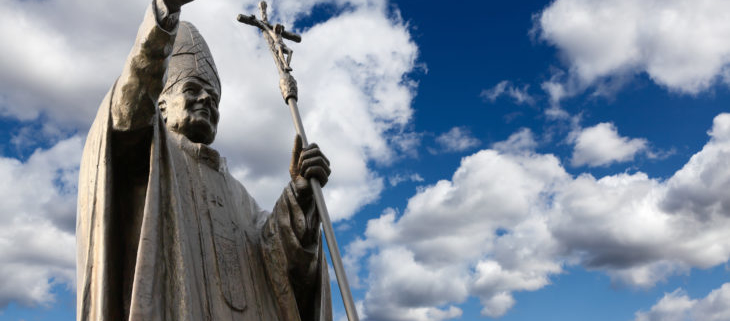Saint John Paul II: His Legacy of Renewal in Faithful Catholic Education
Throughout his pontificate (1978-2005), Pope John Paul II was a champion of fidelity and authentic Catholic identity in education. Within his first six months, he signaled his intention to rein in dissent with Sapientia Christiana, the apostolic constitution defining discipline for ecclesiastical universities and faculties. He later approved the 1983 Code of Canon Law, which for the first time in Church history included canons specifically governing Catholic colleges, including the mandatum for theologians.
With Cardinal Joseph Ratzinger at the Congregation for the Doctrine of the Faith, Saint John Paul II squelched the “liberation theology” movement and silenced several dissident theologians. In 1986, the Vatican forbade dissident Rev. Charles Curran from teaching theology at The Catholic University of America—and the next year, the Holy Father visited Catholic University to deliver an address urging fidelity and reform throughout Catholic education.
His Congregation for Catholic Education issued important guidance in “The Religious Dimension of Education in a Catholic School” (1988) and “The Catholic School on the Threshold of the Third Millennium” (1997). Pope John Paul II gave us the Catechism of the Catholic Church, with great influence over Catholic education and school textbooks. And in 1990, he issued Ex corde Ecclesiae, requiring every Catholic college to demonstrate an “institutional commitment” to the faith, regardless of lay or Church ownership.
With two key encyclicals—Veritatis Splendor (1993) and Fides et Ratio (1998)—Pope John Paul II restored appreciation for what lies at the heart of Catholic education: the absolute compatibility and unity of faith and reason. The first encyclical included a strong message to Catholic educators:
A particular responsibility is incumbent upon Bishops with regard to Catholic institutions. … It falls to them, in communion with the Holy See, both to grant the title “Catholic” to Church-related schools, universities, health-care facilities, and counseling services, and, in cases of a serious failure to live up to that title, to take it away.
Many of John Paul II’s teachings were met with strong resistance from those opposed to strengthening Catholic identity. But inspired by this saintly professor-pope, the Newman Society set out to promote and defend his vision for faithful education. Today, thanks to the Grace of God, the prayers and support of our dedicated members, and a new generation of faithful educators, there is a much needed renewal of Catholic education underway.

